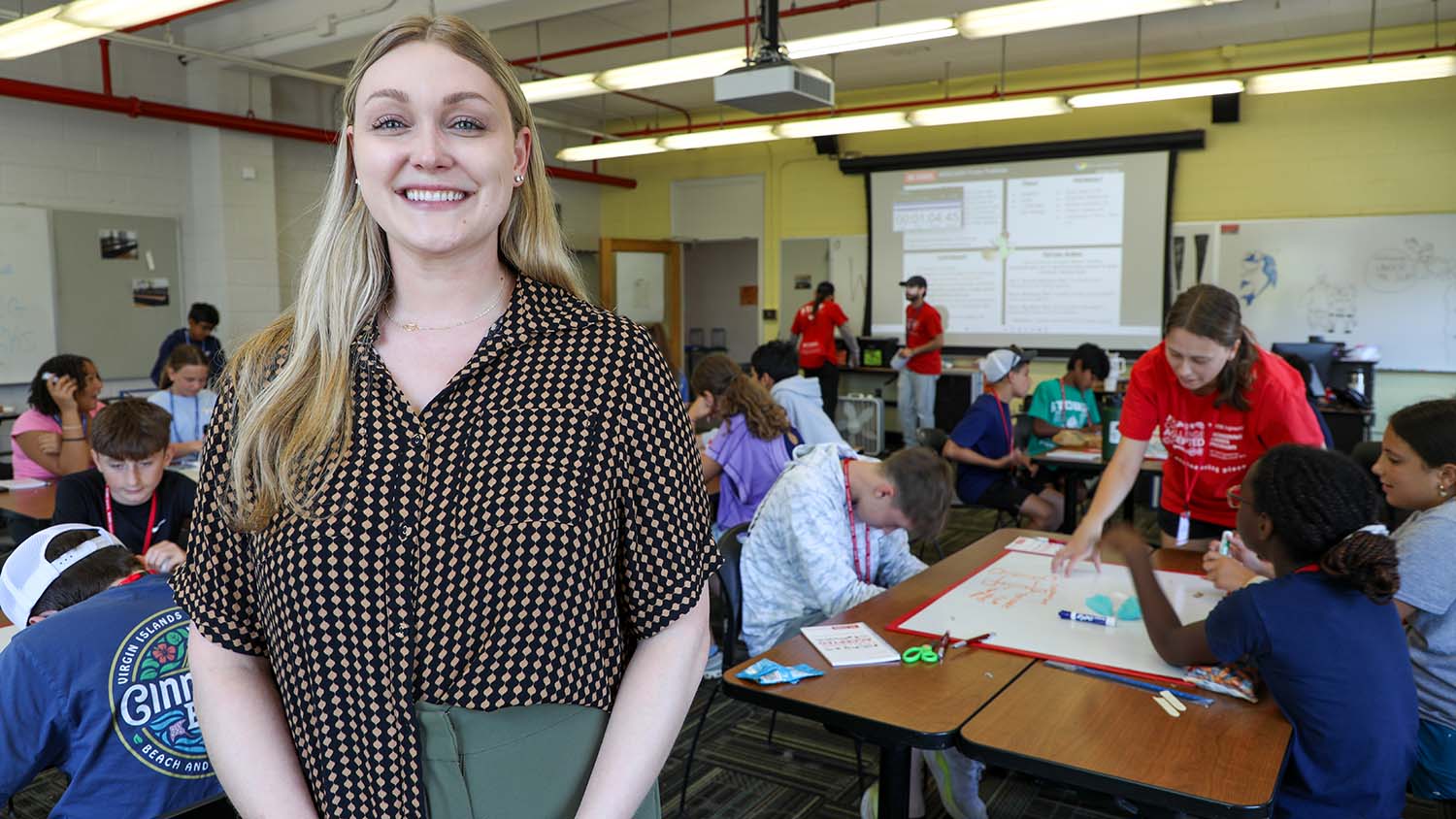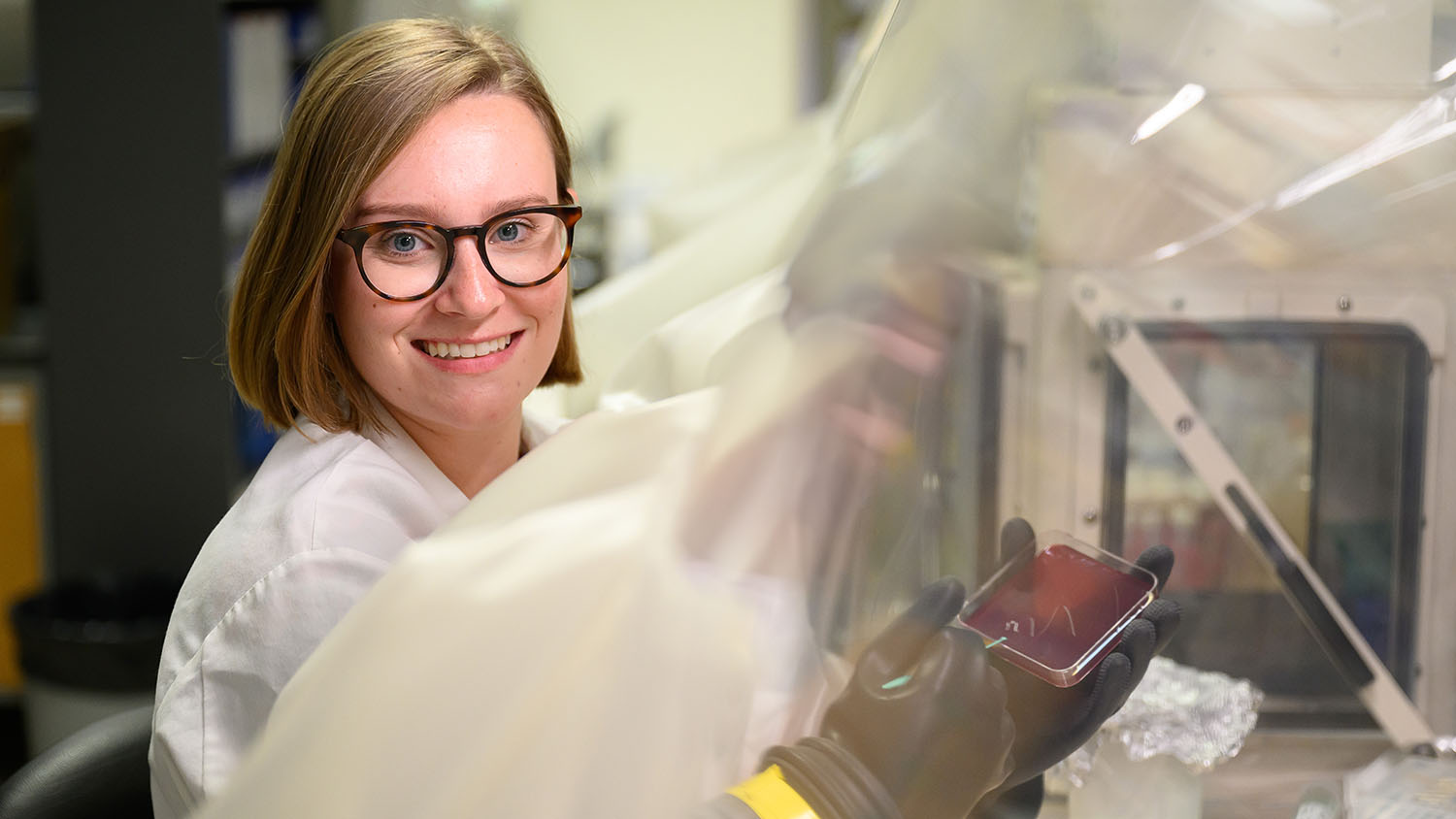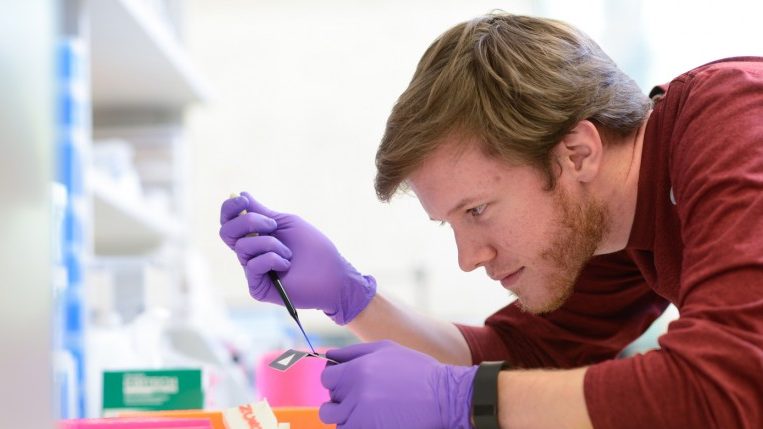Wolf of the Week: Stories from the Field
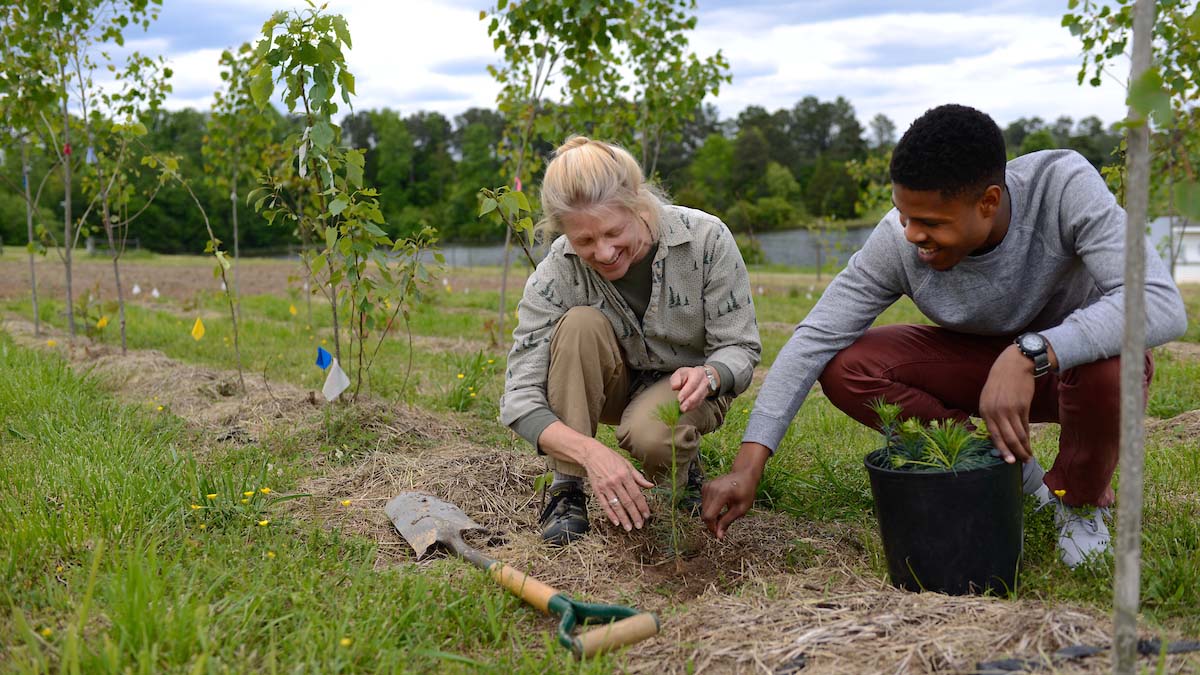
Each week, the Graduate School will feature a graduate student or postdoc who exemplifies exceptional leadership and communication skills both inside and outside of the classroom. The Wolf of the Week student will share research, personal NC State anecdotes and some tips for success. By sharing these stories, we encourage our campus community to celebrate graduate students and postdocs who represent the diversity of programs and projects that can be found on campus.
May 1, 2019 | Latasha Williams
Latasha Williams is a Ph.D. student in the Department of Food, Bioprocessing, and Nutrition Sciences. She holds a B.S. degree in Textile Chemistry from NC State University and in Food and Nutrition from NC Central University. After becoming a Registered Dietitian Nutritionist (RDN), Latasha obtained her M.S. degree in Food and Nutrition from Meredith College. Her current research focuses on the experiences and the role of RDNs who work with mothers of preschool age children who face low to very low food security.
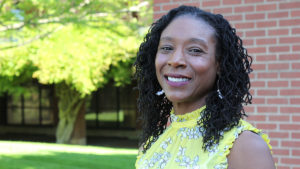
Sciences.
Can you tell us about your research/teaching experience?
While working as a Registered Dietitian Nutritionist (RDN), I spent many days listening to patients describe how low to very low food security during childhood influenced their dietary habits as adults. Not fully understanding the phenomena of food security, I started doing research on my own. After running across a report from the Life Sciences Research Office, I came to learn that food security encompasses the “access by all people, at all times to enough food to live a healthy and active life.” After reading this report, it did not take long for me to discover that nothing about the human diet makes sense except in light of food security. With this new knowledge, I made the decision to learn how I could do more as a RDN, specifically working with mothers of preschool age children experiencing low to very low food security. My initial research goal is to learn about the experiences of RDNs working with mothers who do not always have access to enough food to eat. Ultimately, I hope this research will lead to the development of systematic and sustainable interventions that can be used by RDNs to make a positive impact at all levels of food security.
What do you like the most about NC State? Or why did you choose to come to NC State?
When I graduated from high school, NC State was my first and only choice for college. When I decided to pursue a Ph.D., NC State was my first choice for graduate school. There are so many things I enjoy about NC State, but what stands out most are the people. From faculty and staff, to graduate students and undergraduate students, there is a wealth of diverse knowledge across campus. The diversity at this university lends to an almost overwhelming abundance of resources available for anyone to succeed.
What is something that you have learned from The Graduate School’s professional development programs that you’re applying to your work or teaching?
Through the professional development programs (PDP) I learned how to avoid death by PowerPoint and the perfection trap for writers. I learned how to do things with Moodle that I did not know was possible in regards to grading and creating interactive online content for students. Through the New TA workshops, I learned how to create an inclusive environment as well as several steps to improve my teaching. And even though they are both still works in progress, I started writing a teaching philosophy and creating an online professional portfolio. But so far, my two favorite PDP programs have been Camp Completion and Communication Strategies for Teaching and Beyond (CSTB). Participating in Camp Completion taught me ways to develop better writing habits and how to tailor the Pomodoro Technique to fit my writing style. In CSTB, the best thing I have learned is the ABT model – And, But, Therefore or Always Be Telling (stories). The ABT model has transformed how I discuss my research, especially with those outside my discipline.
Can you tell us a fun fact about yourself?
I have been a Jazzercise Instructor since 2005 and I currently teach classes 5-6 days/week.
April 25, 2019 | Ciera Cipriani
Ciera Cipriani is a Master’s student studying Textile Chemistry at Wilson College of Textiles, co-advised by Dr. Melissa Pasquinelli and Dr. Nelson Vinueza. She won first place in The Graduate School’s Three Minute Thesis Competition (October 2018), thus advancing to the regional competition. Ciera is a North Carolina native who showcases her musical talent as a drummer in local band Soccer Tees and as a DJ at NC State’s radio station, WKNC. She also works as a teaching assistant, and she is a Pentair Fellow at NCSU Libraries.
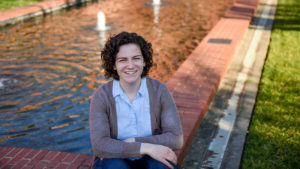
Can you tell us about your research/teaching experience?
The goal of my research is to narrow down the chemical reaction mechanisms that happen when dyes widely used for polyester and other synthetic fibers are exposed to sunlight. When these dyes break down, they lose their color. Also, the chemical compounds formed as a result of this process can be more toxic than the original dye molecules. I combine computer models with experiments on dyed fabrics to fundamentally describe the reaction mechanisms of light degradation. My work brings us closer to preventing the loss of color and formation of toxic products from these dyes.
What do you like the most about NC State? Or why did you choose to come to NC State?
I’m from the area and naturally considered NC State for my undergraduate degree since it was close to home. I committed to NC State after attending the Polymer Day Camp at the Wilson College of Textiles in 2013. I was intrigued by the incredible research being done at NC State and the close-knit, collaborative community of Wilson College. I decided to attend NC State for undergrad, and continued as a master’s student in order to round out my research project into a thesis (and because I wasn’t ready to say goodbye just yet).
What is something that you have learned from The Graduate School’s professional development programs that you’re applying to your work or teaching?
I participated in The Graduate School’s workshop for the Three Minute Thesis Competition. In a short time, the workshop taught me a lot about communicating my research to a broad audience. I took the draft speech that I wrote during the workshop and crafted it into my winning Three Minute Thesis talk for the university competition. Now, I use the framework that I learned in The Graduate School’s workshop to have more productive scientific discussions with my colleagues, professors, employers, and students in the class for which I TA.
Can you tell us a fun fact about yourself?
I moonlight as the drummer in the band Soccer Tees. As the drummer in the band Soccer Tees, I moonlight as a comedian called Snowbiz, providing hopefully entertaining banter between songs while my bandmates tune their guitars.
April 11, 2019 | Vivek Samu
Vivek Samu is a postdoctoral research scholar in the Department of Civil, Construction, and Environmental Engineering, where he also completed his Ph.D. He won the People’s Choice award at The Graduate School’s Three Minute Thesis competition in 2018. In his presentation, Vivek described using low-cost hammer testing to assess the condition of bridge foundations for which there are no extant records. In addition to his Ph.D. in structural engineering, Vivek completed a graduate minor in applied mathematics.
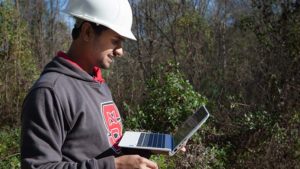
Can you tell about your research/teaching experience?
I have had a very rich research experience and exposure at NC State. My research is related to testing of bridge foundations using wave propagation methods to assess its current condition. I have been involved in both theoretical and experimental research and this has helped me develop a unique skill set which will be the foundation for my future endeavors. I have been a teaching assistant for different courses and also had the opportunity to teach an undergraduate course. I have always had the fear of facing a big crowd and the extensive amount of teaching experience has helped me conquer my fears. I have been lucky to be mentored by several extraordinary professors in the Civil Engineering department over the years which has helped me become a better teacher.
What do you like the most about NC State? Or why did you choose to come to NC State?
My association with NC State started in fall 2012 when I decided to join for my Master of Science in Civil Engineering and quickly fell in love with NC State and Raleigh. I was amazed at the amount of resources available for the students and the constant encouragement by my advisor, professors and peers. I am particularly a fan of the NC State Libraries and their Tripsaver program which has been very helpful.
What is something that you have learned from The Graduate School’s Professional Development Programs that you are applying to your work or teaching?
Apart from research, NC State has provided me with several opportunities to learn essential personal and professional skills without which I could not have succeeded in my academic pursuit. I have participated in professional development programs such as Preparing the Professoriate (PTP), Three Minute Thesis (3MT) and Camp Completion. PTP was a unique program which has provided me with a lot of resources to prepare myself for an academic career through workshops, collaboration with experts and teaching experience. Often as researchers we focus a lot on details and forget the broader view and implications of the research. Participating in the Three Minute Thesis competition helped me take a step back in an effort to explain my research to a non-technical audience, at the same time improving my science communication skills.
Can you tell us a fun fact about yourself?
I love sports and to stay active! Whenever I get time, I like to play cricket, tennis or table tennis. I have been playing in the Triangle Cricket League over the years and never miss an opportunity to get into a cricket ground.
April 2, 2019 | Whitney McCoy
Whitney McCoy is a Ph.D. student in educational psychology. She is a native of High Point who worked as a K-6 math and science teacher before coming to NC State. She holds degrees from Winston-Salem State University as well as UNC-Charlotte. Whitney is heavily involved in improving the graduate student experience through participation in the College of Education Graduate Student Advisory Board, the Teacher Education and Learning Sciences Graduate Student Association, and the Black Graduate Student Association.
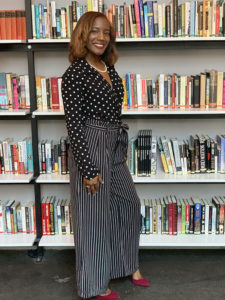
Can you tell us about your research/teaching experience?
Currently, I am working on a research study that examines how African American students experience racial microaggressions at predominately white institutions. My dissertation research will focus on racial and gender equity in engineering education. The purpose of my dissertation is to understand and examine the experiences of African American adolescent girls (i.e. Black female intersectionality) who are participating in an informal summer engineering program. I have been a teacher assistant for a graduate level course and will teach an undergraduate course this summer. The courses focus on adolescent development. I have also guest lectured on the disciplinary procedures that lead to the push out of African American girls in K-12 schools.
What do you like the most about NC State? Or why did you choose to come to NC State?
I love that there are so many resources here on campus to support doctoral students. On this campus, you can collaborate with multiple colleges such as the College of Education and the College of Engineering, attend professional development programs, and there are speakers that visit the campus to educate students on numerous topics. Also, being supported by faculty members like my advisor Dr. Jessica DeCuir-Gunby made it very easy to make the decision to come to NC State.
What is something that you have learned from The Graduate School’s professional development programs that you’re applying to your work or teaching?
In the Preparing the Professoriate program, I learned the value of peer review and feedback as you write. Writing can be a tedious task when you are working on papers for classes, manuscripts for publishing, and statements for job applications. Collaborating with peers that can give you feedback has helped me become a stronger writer and more open to sharing my writing with others. This led me to form an accountability group with other doctoral students that are in various stages of their programs.
Can you tell us a fun fact about yourself?
Before coming to NC State, I was a K-6 educator. I loved science, but never taught engineering in my classroom. After learning about the NC State Summer Engineering Programs and participating in the Learning Experience for Teachers, I fell in love with the magical “E” that allows us to solve problems to help people through design and innovation. Now, I am able to train K-12 educators on how to integrate all content areas (i.e. literacy, mathematics, science, and history) to teach engineering in their classrooms and engage K-10 campers in hands-on engineering challenges on campus and in surrounding public schools.
March 25, 2019 | Mary Adams
Mary Adams is a Ph.D. student in the Joint Department of Biomedical Engineering at UNC & NC State. She completed her B.S. in biological engineering at the University of Florida. Her undergraduate studies included a summer in Germany studying special engineering topics related to energy conservation and renewable energy. At NC State, Mary focuses on the pharmacological applications of engineering.
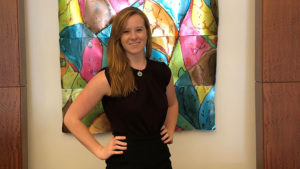
Can you tell us about your research/teaching experience?
My research is in cancer drug delivery with the goal of reducing off-target side effects. I have worked with clinicians at UNC as well at NC State’s College of Veterinary Medicine to set up cutting-edge drug delivery experiments and even learned how to perform rodent brain injections. My teaching experience has involved undergraduate research mentoring and tutoring high schoolers in foster care at the Hope Center on Pullen Road. I am also in charge of running the week-long Engineering Place summer camp put on by the biomedical engineering department for high schoolers to learn and solve challenging problems in our field.
What do you like the most about NC State? Or why did you choose to come to NC State?
I love how diverse the Raleigh area is and the friendly people I have met throughout my graduate career. Whenever I need help there is a resource on campus that can accommodate my needs. NC State has the perfect mix of academics, sports, and nightlife and my love for this school has grown bigger every day.
What is something that you have learned from The Graduate School’s professional development programs that you’re applying to your work or teaching?
The Graduate School’s professional development programs have helped me to organize my research ideas, hone my writing style, and have aided in my presentation skills. I have participated in the Accelerate to Industry™ program to learn about getting an industry job as well as attended writing workshops. From the Graduate School’s resources, I have learned how to create an eye-catching resume, portray confidence to industry recruiters, and logically explain my research to people from different backgrounds.
Can you tell us a fun fact about yourself?
Along with the research I am doing, I am fascinated by small sea organisms and am starting a nano reef tank. I am learning how to obtain proper water conditions and eventually want to get seahorses in my tank! I also enjoy playing volleyball, scrapbooking, and cooking.
March 13, 2019 | Yunkai “Kai” Xiao
Yunkai “Kai” Xiao is a Ph.D. student in Computer Science. His research involves using data science to improve student learning outcomes. As part of the Teaching and Communication certificate program, he designed a course that would teach programming through the hands-on application of basic game design. One of his goals is to increase the accessibility of computer programming to a broader and more diverse group of students.
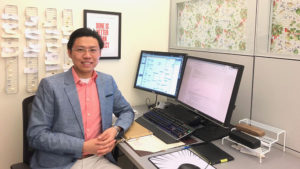
Can you tell us about your research/teaching experience?
I was a graduate assistant at UNC Wilmington for three years. I worked at the Institute for Interdisciplinary Identity Sciences (I3S Lab) on campus for two years doing computer vision research on faces as well as natural language processing. As a teaching assistant, I mentored lab sessions for around 200 students as well as doing office hours, grading, etc. for 400 students.
Currently, I am a Machine Learning and Natural Language Processing researcher in the Peer Logic Lab, and my research focus is educational data mining and using peer-review to enhance students’ learning experience and boost their performance.
What do you like the most about NC State? Or why did you choose to come to NC State?
The spark of ideas. There are so many people I can talk with, fellow Ph.D. students, lecturers and guests, almost every time I can come back with something learned or new research ideas.
Advanced topics. There are so many classes that would only be taught at universities of this scale. I found so many useful topics to fit into my limited schedule.
What is something that you have learned from The Graduate School’s professional development programs that you’re applying to your work or teaching?
The A2i program has revealed some true business insight and helped me reshape my perspective toward industry; this has helped me in my job search.
The Teaching and Communication certificate program made me aware of what to deliver to students, how to convey messages and clear expectations. This has helped me significantly in clearing up confusion between instructors and students as well as preventing potential disputes over grades.
New TA Workshop was a very useful event for incoming TAs; it addressed many things that really did happen in our work. I was able to deal with students violating rules in exams, asking for extra credit, as well as other issues.
Can you tell us a fun fact about yourself?
I spent a year raising cows and ducks in West Virginia while in a high school exchange program and received another high school degree.
March 7, 2019 | Madilynn McCollum
Madilynn McCollum is a Ph.D. student in the Wilson College of Textiles Textile Protection and Comfort Center whose research focuses on particulate blocking textiles. She received her Masters in Textile Chemistry also from the Wilson College in 2017. In addition to teaching within her department, Madilynn has supervised numerous undergraduate researchers and is one of six graduate students collaborating on her current project.
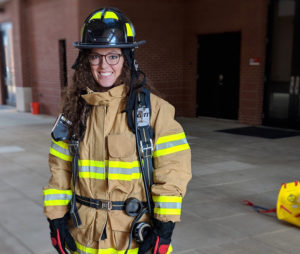
Can you tell us about your research/teaching experience?
My current research as a part of the Textile Protection and Comfort Center (TPACC) focuses on cancer prevention for firefighters through the means of particulate blocking hoods. Cancer is very prevalent in the firefighting community due to the carcinogenic and toxic particles found in smoke and soot. My research involves the evaluation of these particulate blocking layers as particulate filters as well as the comfort trade-off of introducing another fabric layer into the burdensome firefighting ensemble.
I have been teaching at the Wilson College of Textiles as a Teaching Assistant since my first semester here and am now an Instructor of Record! I was first assigned to teach a textile wet processing lab and I am currently teaching an introductory fiber science course to all years and majors of Textile students.
What do you like the most about NC State? Or why did you choose to come to NC State?
I chose to come to NC State because of the state of the art Wilson College of Textiles. This college has the capacity to do basically any textile manufacturing process or test you need all under one roof! The technology available to students and the industry collaboration within the Wilson College of Textiles is truly incredible. I am so honored to have come here for graduate school working with such amazing faculty, staff, students, and industry partners!
What is something that you have learned from The Graduate School’s professional development programs that you’re applying to your work or teaching?
The Graduate School’s Professional development programs have immensely helped elevate my teaching as well as my professional resume. Through attending seminars and being a part of the Preparing the Professoriate program I have been able to keep my teaching up to date by implementing new activities and techniques. I have also learned how to market myself as a professional, learning crucial tips about the job search and the interview process. I know I will graduate as a more confident and knowledgeable researcher and professor because of The Graduate School’s programs.
Can you tell us a fun fact about yourself?
Every Thursday night I teach tap, hip hop, and jazz to dancers ages 3-13 at a dance studio in Cary!
March 1, 2019 | Chasity Skusa
Chasity Skusa is a Master’s student in the Department of Communication with a wide range of research interests in the general area of public relations. Chasity hails from Rennert, North Carolina, and completed her B.S. at UNC-Pembroke. She currently works as a senior marketing intern for a nonprofit specializing in equine assisted psychotherapy. She also owns her own photography business.

Can you tell us about your research/teaching experience?
My relationship with research can be summed up as “interested in everything and dedicated to nothing!” It’s true, since starting my graduate career at NC State I’ve had focuses on Divorce Communication, Near Miss Communication in connection to airplane safety and pedestrian crosswalk safety, Anthrax poisoning, The #MeToo Movement, USA Gymnastics and the Larry Nassar Scandal (one of my favorites), SlutWalks, Non-Profit Communication and I am currently working on an autoethnography. I come from a family of public school educators and administrators so deciding to teach was something I rebelled against for a long time. I’m not sure when it happened, but teaching now is the one thing in the world I want to do because of the change I know I can make in the way students see the world around them. I know that sounds cliché, but with the field of Communication growing so rapidly it is important that students in the discipline are taught to understand they have moral and ethical values to uphold for their society.
What do you like the most about NC State?
What I love most about NC State is the diversity that is found in the classroom. At times I’ve sat next to people in my classes from Russia, Africa, India, China, Singapore, Ethiopia, and the list continues; that moment is inspiring in and of itself. I am from a small Native American (Lumbee) community that has a population of 381 so you can imagine the lack of diversity. Meeting these people and learning how other cultures live has made me, a future instructor, swear to keep my classes as culturally inclusive as possible.
What is something that you have learned from The Graduate School’s professional development programs that you’re applying to your work or teaching?
I understand so much more about effectively communicating as an instructor from the Teaching and Communication certificate program offered by The Graduate School. I’ve learned about different types of students, how they learn, and even external factors that an instructor should take into account when introducing material to their students for the first time.
Can you tell us a fun fact about yourself?
I own my own Photography business, JC Photography, that I founded in 2016 when I was still in undergrad.
February 20, 2019 | Sugandha Singh
Sugandha Singh is a Ph.D. student in the Department of Civil, Construction and Environmental Engineering working in the field of Structural Dynamics. She is from Uttarakhand, India. She has participated in professional development activities such as the Teaching and Communication Certificate and Academic Packways. Sugandha is also VP of Academic Affairs in the Graduate Student Association where she coordinates and works with a committee to award grants to graduate students for their conference travel.
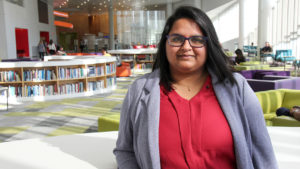
Can you tell us about your research/teaching experience?
My research is in the area of earthquake engineering, specifically looking at how components within a structure respond to earthquakes in the Central and Eastern United States. I have been teaching the structural behavior lab for the past four semesters and each semester, I have learned something new from my students. It has been a very profound experience to teach at NC State which has prepared me well for my future career as a professor in India.
What do you like the most about NC State? Or why did you choose to come to NC State?
NC State is where my life took me as a master’s student but in the last 4.5 years, my love for NC State has only increased and mostly because of the people I have met as a graduate student. Everyone is trying to help each other as much as they can. I believe that the support I received from my peers at NC State is going to help me succeed in the future.
What is something that you have learned from The Graduate School’s professional development programs that you’re applying to your work or teaching?
I have learned a lot from a variety of professional development programs offered by the Graduate School. Most importantly, through the Teaching and Communication Certificate, I first got the confidence that I needed to teach well in my class. I learned different teaching techniques and I apply most of them in my class and sometimes in the presentations I give. Since I plan to go into academia in the future, these techniques will also help me to develop my courses and teaching style. Moreover, I also got a lot of help in preparing my application materials for applying to jobs which is one of the hardest tasks after we graduate.
Can you tell us a fun fact about yourself?
I am an amateur photographer and am slowly developing my skills by taking photos in and around Raleigh but mostly of my little puppy, Penny. I have managed to get four of my photos to be digitally exhibited in various exhibitions in Europe and very recently got a photo published in one of India’s biggest national newspapers. However, I like to take photos only as a hobby; my passion will always be in teaching.
February 11, 2019 | Lyniesha Wright
Lyniesha Wright is a Ph.D. student in the Department of Chemistry. Her research area is chemistry education and she has extensive teaching experience both as a teaching assistant at NC State and as a high school teacher. In “They’re Just a Little Bit Taller,” her contribution to The Mole Storytelling Jam at the Biennial Conference on Chemical Education 2018, Lyniesha tells a story that compares her experience as a new teacher of physics, biology, and chemistry with that of a graduate student teaching assistant.
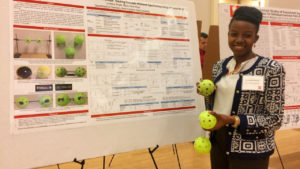
Can you tell us about your research/teaching experience?
My research combines chemistry with the science of teaching and learning. I use educational research to design materials to better enhance undergraduate chemistry students’ visualization of molecular concepts. With a focus on spectroscopic techniques, I create physical or augmented models for students to interact with. One of the best parts of my research is that I can incorporate it into the classroom as a teaching assistant to obtain a firsthand understanding of the success of the approach.
What do you like the most about NC State? Or why did you choose to come to NC State?
I chose NC State because my advisor, Dr. Maria Oliver-Hoyo, is a champion in the field of chemistry education. I love that NC State has so many resources for students to tap into. If you want to improve upon or learn a new skill there is likely a class or workshop here that will teach you how.
What is something that you have learned from The Graduate School’s professional development programs that you’re applying to your work or teaching?
The great thing about these programs is that they attract students from different colleges and departments. During the workshops, we exchange papers, observe others’ presentations, and give feedback. Not only has this improved my work and opened my perspective, but it has also helped my teaching become more interdisciplinary. I can often incorporate things I have learned from others into the work I am doing.
Can you tell us a fun fact about yourself?
As an undergraduate student, I did a sustainability internship in Panama where I lived in a rancho in the rainforest without electricity or running water for 11 weeks. It was the best summer of my life.
February 5, 2019 | Dylan White
Dylan White is a Ph.D. student in the Department of Marine, Earth, and Atmospheric Sciences whose research focuses on tropical meteorology. In addition to teaching labs within his program, Dylan has collaborated on a teaching module for the Statistics department and regularly shares his LaTeX expertise with others. Dylan is a North Carolina native who will begin his career by working for the federal government.
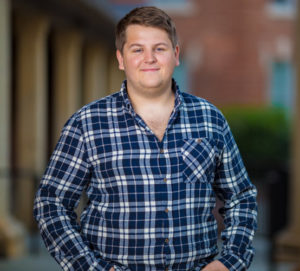
Can you tell us about your research/teaching experience?
My research is on tropical meteorology, specifically on large weather systems over tropical Africa. I’ve taught a few upper-level lab courses at NC State, and that was actually pretty scary at first because I had never actually taken the course I was teaching! But I’ve learned a lot about how to teach students through that experience and through the Teaching and Communication certificate program. I think now I prefer teaching to doing research.
What do you like the most about NC State? Or why did you choose to come to NC State?
I actually went to NC State for my undergraduate degrees as well, and I stayed for graduate school in a different department. I love NC State! It’s perfectly geographically located next to the coast and mountains, Raleigh is a great city, and the university has a lot to offer. As a graduate student, I really value the focus on professional development. It is so often portrayed that a graduate student is simply a tool to earn the school more published research, but at NC State I feel like the school is investing in me as much as I am in it.
What is something that you have learned from The Graduate School’s professional development programs that you’re applying to your work or teaching?
I’m definitely over-simplifying, but if I could sum up everything I’ve learned from The Graduate School’s professional development programs, I would say it is to keep everything clean and simple. Whether it’s teaching, professional documents, or even just professional conversations, this has been the best approach for me. I used to have a tendency to make things flashy or to try to demonstrate my capabilities when I was in these professional settings, but it always came across in the most abrupt and jarring way possible. Now, I find that taking it easy and keeping everything tidy, organized, and simple communicates my point in a much more elegant and understandable way. Some people do a great job at combining complexity and efficient communication, but that just isn’t me.
Can you tell us a fun fact about yourself?
In a little under a year, I will be moving to Virginia to start my first job for my career! I still have no idea what I want to do when I grow up, but I’m looking forward to learning new things and applying what I have learned. It’s also the perfect time to get a second dog, and that’s really what I am looking forward to the most.
December 5, 2018 | Sarah Hammond
Sarah Hammond is a Ph.D. student in the Educational Leadership, Policy, and Human Development program, and she also works as a Social/Clinical Research Specialist in the Department of Clinical Sciences at the College of Veterinary Medicine. Sarah has published multiple journal articles on vet student communication. Recently, Sarah produced “On the Margins of Veterinary Medicine,” a documentary that explores the experiences of underrepresented students in veterinary medicine.
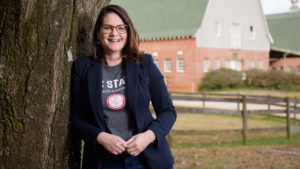
Can you tell us about your research/teaching experience?
My research interests are focused primarily on equity issues in education. I’m especially interested in education policies surrounding access and attainment for underrepresented groups and how our school systems can best support the development of our most vulnerable students. Working at the College of Veterinary Medicine for the past five years has given me ample opportunity to conduct research and advance my teaching skills. I use both quantitative and qualitative research methods to study critical issues surrounding student development, diversity, and holistic admissions processes. I deliver guest lectures on the importance of intercultural communication, which helps first-year veterinary students learn to apply their communication skills in culturally competent ways that value the diverse characteristics of their future clients and colleagues. Running our simulations lab, I’m able to help students practice their communication skills in authentic and meaningful ways that not only improve student confidence and skill development but ultimately, patient outcomes.
What do you like the most about NC State? Or why did you choose to come to NC State?
One of the best things about NC State is the high-quality mentorship that our faculty provide throughout the University. I feel equally supported by both the faculty in my program and the faculty at the College of Veterinary Medicine. Both colleges have been instrumental in developing my identity as a scholar and advocate. It doesn’t matter if I’m in Poe Hall or over on William Moore Drive, there is no shortage of knowledgeable compassionate mentors who exemplify the very best of their field. I’m lucky to be able to learn and grow under such passionate faculty but even luckier to have had the mentorship needed to develop my own passions. It takes a village, right?
What is something that you have learned from The Graduate School’s professional development programs that you’re applying to your work or teaching?
Oh, my gosh. There is so much! The Graduate School’s teaching and communication certificate has helped me practice and develop my teaching skills in ways that I never would have had the opportunity to do otherwise. The program has given me insight into effective instructional strategies and unique ways to promote student learning. Being able to practice those strategies and receive feedback from individuals in other disciplines has been invaluable to my experience as a developing educator. I find that graduate school can feel overwhelming in the sense that everything we need to know to be successful isn’t always provided in our curriculum. The Graduate School’s professional development programs really help to fill that gap between becoming an expert scholar and a well-rounded professional able to navigate the world post-graduation.
Can you tell us a fun fact about yourself?
I really enjoy spending time baking cakes and cookies. I love trying new techniques and right now I’m trying to master painting with buttercream. I wish I could compete on the Great British Baking Show. I dream of hearing those six magic words, “On your mark, get set, bake!”
November 28, 2018 | James Russell
James Russell is a Ph.D. student in the Marine, Earth, and Atmospheric Science program. James is from Southampton, England, and earned one of his Master’s degrees from the University of Oklahoma. In January, he will begin a postdoc position at the University of Utah.
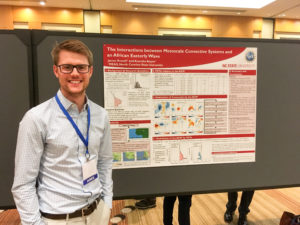
Can you tell us about your research/teaching experience?
My research is in tropical meteorology. More specifically, I use large datasets and high-resolution computer simulations to understand how tropical thunderstorms interact with larger scale atmospheric waves over Africa. These waves are the starting point for hurricanes so understanding them is essential to improved prediction of extreme weather. I have taught multiple classes in atmospheric science. These range from the basic introduction to meteorology for non-majors, to a senior level atmospheric dynamics course.
What do you like the most about NC State? Or why did you choose to come to NC State?
I chose to attend NC State primarily because of my advisor and the specific research I have been able to do under him. Since I’ve been here, I’ve loved the numerous opportunities that I’ve had across the University, with the professional development programs central to those. I really feel that everyone at NC State (i.e. professors, graduate school, university administration) values the training of graduate students above what graduate students can do for them.
What is something that you have learned from The Graduate School’s professional development programs that you’re applying to your work or teaching?
The semester-long development series, as a part of the Teaching and Communication certificate, were invaluable. I only took two and I wish I had the time to take more. Specifically, I took courses on curriculum design and building a professional portfolio. From the former course, I have used backward design principles (i.e. building a syllabus starting from the course goals) which have been useful to my teaching. From the latter course, building a professional portfolio with guidance was a great experience, and has already helped me find a postdoc. I fully expect to build on what I developed in that course to find an academic job.
Can you tell us a fun fact about yourself?
Technically I have no Bachelors degree but two Masters! My undergraduate program in England was direct to a Masters degree. Because of the difference in the UK and US education systems, I opted to get a second Masters degree, before doing my Ph.D.
November 19, 2018 | Teng Su
Teng Su is a postdoctoral research associate in the Joint Department of Biomedical Engineering at UNC Chapel Hill and NC State University with an extensive knowledge and expertise in bioengineering and regenerative medicine, directed by Dr. Frances S. Ligler, Lampe Distinguished Professor of Biomedical Engineering, and Dr. Ke Cheng, Professor of Regenerative Medicine. Apart from his research on fighting heart disease, Teng enjoys mentoring students and visiting faculty. He was the recipient of the 2018-2019 Professional Development Award for Postdocs.
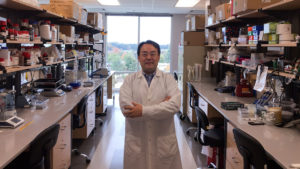
Can you tell us about your research/teaching experience?
I study microfluidic technology, stem cell therapy, and cardiac regeneration, with an emphasis on bio-inspired micro/nano engineering and biomaterial-based methods. I have a keen interest in understanding instrumental factors that contribute to tissue impairment and limit repair efficacy and exploring approaches to targeted repair of heart injury. Besides research, I have had the pleasure of mentoring 16 students and visiting faculty so far. I enjoyed creating new stuff with them and seeing them progress.
What do you like the most about NC State?
The “Think and Do” mentality and the delightful atmosphere of camaraderie and collaboration at NC State are what make me feel at home. NC State has been providing me with a unique and strong environment to ever expand my research horizons and inspire me to bring my aptitudes and skills to make a positive difference in people’s lives.
What is something that you have learned from The Graduate School’s professional development programs that you’re applying to your work or teaching?
I have benefited enormously from the professional development workshops and courses offered by the Graduate School, especially those leading toward the Certificate in Teaching and Communication. The effective communication skills practiced and strengthened through these programs mean a lot to me.
Can you tell us a fun fact about yourself?
80% of my research ideas come from 20% of my time spent on listening to symphonies.
November 5, 2018 | Suzanne Crifo
Suzanne Crifo is a Ph.D. student in the Department of Mathematics with a minor in Operations Research. She has participated in numerous Graduate School professional development programs including Preparing the Professoriate, Academic Packways: Gearing Up for Faculty, and the Teaching and Communication Certificate, as well as GIST, a graduate student teaching interest group in her department.
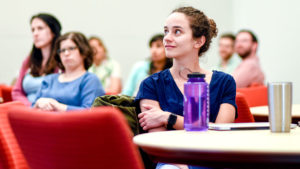
Can you tell us about your research/teaching experience?
My research is in pure mathematics, specifically affine Lie algebras and their representations. I determine maximal dominant weights and try to compute their multiplicities. My research basically involves spotting patterns and proving that those patterns truly exist. I have been lucky enough to serve as Instructor of Record for seven classes in the math department at NCSU. I have taught classes as small as 6 students and as large as 176.
What do you like the most about NC State? Or why did you choose to come to NC State?
I love the people. I chose to come to NC State because the math department seemed welcoming and collaborative. I’ve made many friends here and I’m grateful for that. I quickly grew to love the opportunities provided by The Graduate School, Wellness and Recreation, and Raleigh itself.
What is something that you have learned from The Graduate School’s professional development programs that you’re applying to your work or teaching?
From curriculum development to preparing my application materials, Preparing the Professoriate and the Teaching and Communication Certificate have been vitally important to my success. I continue to implement tricks I learned from workshops and seminars when creating my syllabi and distributing mid-semester class evaluations.
Can you tell us a fun fact about yourself?
I founded and continue to organize the LBD 5k: Lace up to Bring Lewy Down! This run/walk raises funds for the Lewy Body Dementia Association, Inc. and increases awareness about Lewy Body Dementia. If you see me on campus, please ask me about it!
October 22, 2018 | Lucie Guertault
Dr. Lucie Guertault is a postdoctoral researcher in the Department of Biological and Agricultural Engineering. She earned her Ph.D. at Claude Bernard University in Lyon, France, and she has also worked as a postdoctoral researcher at the University of Oklahoma.
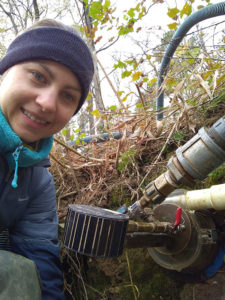
Can you tell us about your research and teaching experience?
I study the transport of sediments and contaminants in streams and how they impact the river morphology and water quality. My work is very varied as I use laboratory and field experiments and numerical modeling, and results are used to design better strategies for river management. I regularly guest-lecture for faculty colleagues’ hydrology classes. Last summer, I was selected for a teaching program offered in the Department of Biological and Agricultural Engineering. I taught a computer methods course, and many assignments were inspired from water resources issues!
What do you like the most about NC State?
I am thrilled by all the professional development opportunities that are offered at NC State, and I really appreciate the special consideration given to postdocs.
What is something that you have learned from The Graduate School’s professional development programs that you’re applying to your work or teaching?
Taking the Teaching and Communication Certificate has considerably improved my teaching as well as students’ feedback in my classes.
Can you tell us a fun fact about yourself?
I have a gravel stuck in the palm of my hand after falling during a hike when I was 5 years old and I always refused to remove it.
October 5, 2018 | Jennifer Archambault
Jennifer Archambault is a Ph.D. student in the Biology program and a research assistant in Applied Ecology. She is currently studying mollusks to research human impacts on stream ecosystems.
Can you tell us about your research/teaching experience?
I’ve specialized in freshwater ecology and toxicology since entering academia in 2010 after a 5 year stint as a wildlife biologist in environmental consulting. In my research, I focus on human-induced impacts on freshwater fauna, particularly mussels and snails. Thus far in my teaching, I’ve enjoyed engaging with my students in lab sections of courses in Freshwater Ecology and Biology of Fishes, which afford students practical experience in field methods and identification skills they will use as professionals.
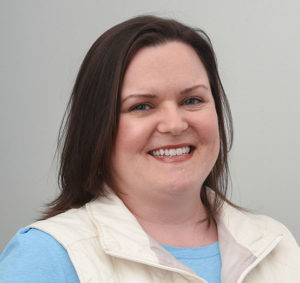
What do you like the most about NC State?
NC State feels like home to me; I’ve spent more than a decade on this campus. I originally came to NC State as an undergraduate transfer student in 2002 to pursue a BS in Fisheries and Wildlife Sciences. I graduated in 2004 and landed my first professional position nearby in the Sandhills region. Later, I wanted to focus more on aquatic wildlife and accepted a Master’s position back on campus in 2010, studying thermal ecology of freshwater mussels. I’ve been here ever since; as an MS student, then as a full-time Research Associate, and now I’m pursuing my PhD, studying the benefits that freshwater mussels provide to people by filtering pollution from rivers, where 2/3 of Americans get their drinking water.
What is something that you have learned from The Graduate School’s professional development programs that you’re applying to your work or teaching?
I’ve taken many professional development workshops during my years here as a graduate student, and am grateful for The Graduate School’s focus here! Most recently, I’ve been taking workshops in pursuit of the Certificate in Teaching and Communication. I previously had no training on how to teach, and I’ve learned so much in a short time on how to be a more effective teacher. From learning how to survive the first day of class to designing my own course, I feel so much more qualified to lead students in learning and I’m eager to put the techniques I’ve learned to use. I can’t stress enough how valuable this program as been to me, and very likely to my competitiveness for faculty positions later on.
Can you tell us a fun fact about yourself?
My interests are all over the map – I enjoy birding and hiking (maybe predictably) just as much as I do knitting, shooting sports, fishing, and puppy snuggling.
August 2, 2018 | Kiran Nihlani
Kiran Nihlani is a Ph.D. student in the Statistics program. She works as a Course Designing Teaching Assistant for the Statistics department, and also instructs undergraduate statistics classes. Kiran has a high level of involvement on campus, serving as an International Student Representative in the GSA and participating in The Graduate School’s Teaching and Communication Certificate and Preparing the Professoriate programs.
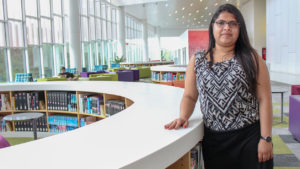
Can you tell us about your research/teaching experience?
My research is focused on improving methodologies for financial risk estimation. I wanted to combine my passion for economics and statistics together and this was the perfect way. The first class I taught at NC State was an introductory statistics course for undergraduates. This summer I am helping develop a new course, Epidemiology and Statistics in Global Public Health, that I will co-teach in the Fall.
What do you like the most about NC State? Or why did you choose to come to NC State?
The decision of coming to NC State was mostly based on my research interests and the people I wanted to work with. The location was also very strategic with two other universities in the area and plenty of industry exposure within reach. Along with a high standard of education and research the campus has a very welcoming, down-to-earth, community vibe to it. It’s a very diverse campus with plenty of opportunities to fit every student based on his/her interests. Finding something to do is never an issue; the real challenge is to find time to fit it all.
What is something that you have learned from the Graduate School’s professional development programs that you’re applying to your work or teaching?
The Teaching and Communication Certificate (TCC) has helped me develop the skill of communicating technical work effectively with a diverse audience. As a teacher, I have been coming up with creative ideas to use different learning styles in designing the course content and in my instructional techniques. It helps me cater to my students better by creating a slightly informal but interactive classroom environment. Also, as an international student I found it a little hard to relate to my class because of differences in our backgrounds. TCC to a large extent has helped bridge this information gap.
Can you tell us a fun fact about yourself?
I have missed a flight even after being 3 hours early at the airport because I was shopping! Also, I am scared of teddy bears.
July 26, 2018 | Zahra Saki
Zahra Saki is a Ph.D. student in the Textile Technology Management program. Her areas of specialty include supply chain management, international business, and market research. Zahra is a TA and has led the The College of Textiles Summer Textile Exploration Program for the past two summers. Zahra recently received an award to work with VF Corporation, the company behind The North Face, Wrangler, and Vans brands. She will work with VF Corporation to develop advanced recommending systems in e-commerce.
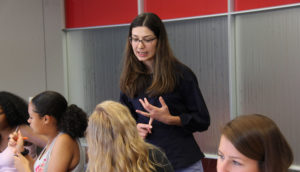
Can you tell us about your research/teaching experience?
My research is divided into two different areas; one is to study the big picture of the U.S. textiles industry and its export competitive position, and the other is to develop a recommending system for apparel brands. One special teaching experience for me is to lead business group projects during the Summer Textile Exploration Program (STEP). I aspire to help young talents with their development and the STEP is a great example of interacting with high school students who are intersected in Fashion and Textile Management.
What do you like the most about NC State? Or why did you choose to come to NC State?
College of Textiles at NC State is a well-known and highly ranked college for textiles education. If anyone looks for the best education in this field, NC State would be the first choice. I like the Textile Technology Management program because of the diversity in research areas, and the fact that it gives you the opportunity to explore your area of interest in the vast world of textiles. Our professors are very supportive and the open space office of graduate students helps us collaborate and learn from each other.
What is something that you have learned from the Teaching and Communication Certificate that you’re applying to your work or teaching?
Throughout the workshops I had the opportunity to practice many short presentations. Each piece of work was critiqued by the professor and the fellow students in the class. Having the feedback was the most valuable part of the workshops, which improved my teaching skills. Additionally, I was able to create the draft of my professional portfolio that will be very useful for coming years when I enter the job market.
Can you tell us a fun fact about yourself?
“My Daddy Long Legs” is my favorite cartoon.
July 18, 2018 | Tyler Allen
Tyler Allen is a recent graduate of the comparative biomedical sciences Ph.D. program in the College of Veterinary Medicine. During his time as a graduate student at NC State, Tyler served as the Graduate Student Association president for two years and was awarded second place in the 2017 Three Minute Thesis (3MT) competition. Earlier this year, Tyler was named to Forbes’ 30 under 30 list, which recognizes visionaries in 20 different industries.
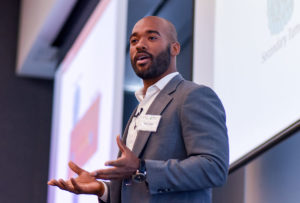
Can you tell us about your research/teaching experience?
My research focuses on how cancer cells exit blood vessels and spread in the body. I am researching this process to better understand the cause and ways to treat it.
What do you like the most about NC State?
I enjoy the atmosphere. There are a plethora of stellar minds and talented individuals at this institution, but the environment never feels intimidating and instead is very welcoming.
What is something that you have learned from The Graduate School’s professional development programs that you’re applying to your work or teaching?
The importance of being able to communicate my ideas and work in an accessible and interesting way. Through programs like the 3MT and the Graduate Student Research Symposium, I was able to learn a great deal about how to communicate my research in a way that engages anyone who listens.
Can you tell us a fun fact about yourself?
I have a pet turtle named Fred that I found outside.
July 12, 2018 | Callie Womble
Callie Womble is a recent graduate of the educational research and policy analysis Ph.D. program, in which she specialized in higher education edministration. The NC State higher education program faculty selected Callie’s dissertation study for the 2018 Higher Education Dissertation of the Year Award. She currently works as a commission research specialist with the N.C. Department of Commerce.
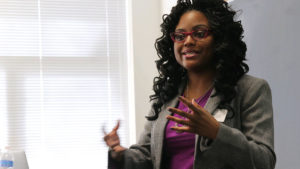
Can you tell us about your research/teaching experience?
I have served as a co-instructor and guest lecturer of undergraduate and graduate courses. I taught courses on student success strategies, student development theory, and the college environment. I also guest lectured on critical race theory and research methods. My research agenda focuses on equity in higher education. The purpose of my dissertation was to understand how being both black and male (i.e., black male intersectionality) shaped the lived experiences and academic success of high-achieving black male undergraduates in engineering majors at a predominantly white institution (PWI).
What do you like the most about NC State?
I love the breadth of opportunity NC State provides. There are so many great opportunities to enrich your graduate experience at your fingertips. I participated in several programs, including the Thesis and Dissertation Institute, Preparing the Professoriate, and the Equal Opportunity Institute.These programs truly enhanced my doctoral experience.
What is something that you have learned from The Graduate School’s professional development programs that you’re applying to your work or teaching?
In the Dissertation Institute and Summer Writing Group, I learned the value of writing accountability. Holding yourself accountable to SMART goals helps writing projects become more manageable and enjoyable. Writing accountability is a skill that I apply in my professional work as a Research Specialist as I often write research briefs and reports.
Can you tell us a fun fact about yourself?
I am a first-generation college student. I have benefited from student support programs like the Gates Millennium Scholarship, and I enjoy “giving back” and “paying it forward”. During my time as a doctoral student, I developed two community-based organizations to support students and professionals of color: The Life Of A Scholar, LLC and The Scholar Academy, LLC.
June 27, 2018 | Huachen Li
Huachen Li is a Ph.D. student in economics. His research focuses on macroeconomics and applied time series analysis (macroeconometrics). Huachen has taught numerous economics courses at NC State, winning the Graduate Student Association Award for Excellence in Teaching in 2015 and Recognition for Excellence in Teaching in 2016. He also works as an adjunct faculty member at Meredith College.
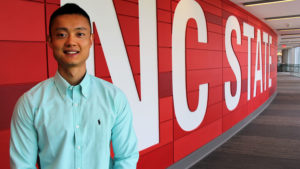
Can you tell us about your research/teaching experience?
During the past 4 years at NC State, I had the opportunity to independently teach a wide variety of economics classes, ranging from introduction courses for first-year students only to core major classes such as econometrics.
What do you like the most about NC State?
The people. Our faculty in the economics department truly care about the students and they put in a lot of effort to ensure every student’s success. All of my colleagues are very easy to be around, and I have made many lifelong friends!
What is something that you have learned from The Graduate School’s professional development programs that you’re applying to your work or teaching?
Courses from the Teaching and Communication Certificate benefited me in both my graduate work and teaching. The program allows me to practice and present my job market paper many times in front of different audiences and with very helpful feedback. On the other hand, the theory and concept of teaching from the certificate program are a perfect complement to the in-class teaching experience.
Can you tell us a fun fact about yourself?
I feel 12.376% better in front of a classroom if I’m using a purple marker.
June 7, 2018 | Tim Becker
Tim Becker is a Masters student in the English department, and his research focuses on epistemology in the teaching of writing. In addition to being a graduate teaching assistant, Tim has led his own workshops on how to use writing in teaching for the Graduate School’s professional development initiative.
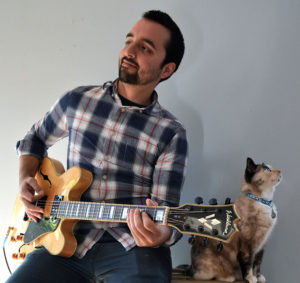
Can you tell us about your research/teaching experience?
I discovered my knack for teaching in industry rather than academia, facilitating employee training events and public technology workshops. Here at NC State, I’m a Graduate Teaching Assistant in the English Department’s First-Year Writing Program. Most of my research involves issues related to epistemology in the teaching of writing. We take writing for granted and often forget that our knowledge practices and human society in general could not exist as they are without it.
What do you like the most about NC State?
NC State’s English department recognizes the importance of preparing teachers of writing with robust theoretical knowledge founded on peer-reviewed research. The department invests in course work, professional development opportunities, and a mentoring program designed to equip teachers with the knowledge and skills to bring greater value to the most universally required courses in the country.
What is something that you have learned from the Teaching and Communication Certificate that you’re applying to your work or teaching?
My biggest takeaway has been to diversify my methods of instruction to engage students of all learning styles and make the classroom a dynamic and interactive learning environment. In the Teaching and Presentation Practicum development series, participants had the opportunity to design, deliver, and receive feedback on several micro-lessons over the course of a semester, with each week dedicated to a different type of instruction.
Can you tell us a fun fact about yourself?
I’ve been a musician for half my life, but after learning all about composition theory in my first semester here, I realized I held several false beliefs about making music that students often have about writing. Giving up these bad ideas and bringing new approaches from the theory classroom to my music practices has changed my life! I recorded and released my debut album at the end of last semester and have another one coming out later this summer.
May 31, 2018 | Alsayed Mashaheet
Alsayed Mashaheet is a postdoctoral associate at Virginia Tech. He is a former NC State postdoc and completed his Ph.D. in plant pathology at NC State in 2016.
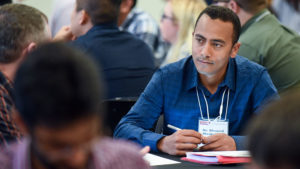
Can you tell us about your research experience?
I studied the interplay of climate change and pathogens on plants, in Egypt, Greece, and USA. My goal has been to identify sensitive varieties that we could use as indicator plants for air pollution, as well as tolerant varieties that could produce more food for the increasing world’s population. I also focused on emerging plant diseases.
Why did you choose to come to NC State?
During my master’s research in Greece, I used two snap bean varieties to detect ozone air pollution. These varieties are being used worldwide, and were developed here at NC State, which ignited my dreams of coming to NC State to pursue my PhD. I learned more about the great facilities and expertise available on- and off-campus, and the multidisciplinary culture at NC State, and I applied for my PhD scholarship, which I was awarded by the Egyptian government in 2012. I believe that NC State is the best school for international students. Being a member of the Wolfpack makes you feel at home, surrounded by people who strive to make you thrive.
What is something that you have learned from The Graduate School’s professional development programs that you’re applying to your work or teaching?
The Graduate School’s programs taught me how to recognize diversity in my audience. I also learned how to tailor my message to fit different audiences. I applied this throughout my teaching, conference participation, and outreach.
The crowning reward for me was when I reached out to pre-K students to teach them about plant diseases. One of those students stopped me at the mall to tell me about a diseased plant his family had at home, and how the symptoms looked on the plant’s leaves. Kids are amazing, and I wouldn’t have been able to enjoy working with them for a whole year without the communication workshops offered by The Graduate School.
Can you tell us a fun fact about yourself?
I like to closely observe my plants and how they respond to their context, especially when they are stressed. I sometimes feel I understand their language, which makes me treat them as my children who can’t go home with me.
May 24, 2018 | Kat Pankratz
Dr. Kat Pankratz is a behavioral medicine resident at the College of Veterinary Medicine. Her research focuses on feline behavior and welfare, including assessing the fear-attenuating properties of gabapentin (a nerve medication) in community cats.
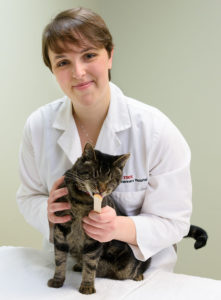
What do you like the most about NC State?
I love the NC State community! Every day, I am heartened by my mentor and colleagues at the NC State College of Veterinary Medicine. The welcoming camaraderie inspires me to think and do my best. I am grateful to be a part of the NC State CVM team.
Can you tell us about your teaching experience?
Throughout my residency, I have had many opportunities to teach veterinary behavior to the veterinary students in class, club lectures and clinical rotations, my colleagues and through outreach to veterinarians and the public outside of NC State.
What is something that you have learned from the Teaching and Communication Certificate that you’re applying to your work or teaching?
Through readings, discussion, mock presentations, peer evaluation and self reflection, I’ve learned that I am never finished learning about how to be a more effective teacher. The Teaching and Communication Certificate motivated my life-long strive to always improve my communication from traditional lectures to client communication.
Can you tell us a fun fact about yourself?
I enjoy expanding my teaching (positive reinforcement training) experience to my 4-year-old blind cat (Kaeto). Some of his favorite “tricks” are to perch on my shoulder, play dead and turn off the lights.
May 3, 2018 | Dianna Francisco
Dianna Francisco is a Ph.D. student in marine, earth and atmospheric sciences whose research focuses on predicting severe storms in the Southeastern United States. She is one of the first students to complete the Graduate School Teaching and Communication Certificate.
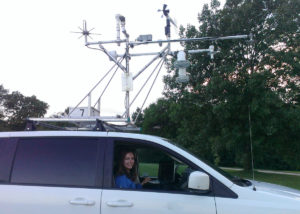
Why did you come to NC State?
We have a great faculty in my department and we focus on modeling. It’s a land grant institution, so I really like the idea of conducting research that immediately goes into use and helps the community. I was collaborating with the National Weather Service during my master’s degree, and that’s when I first realized that I wanted to collaborate with the NWS forecasters for my Ph.D. by actually making forecasting models.
How have you applied your professional development training in real life?
With the semester-long development series, you can dig deep and learn more details. For example, taking the Teaching and Presentation Practicum, I was still shy with my teaching techniques, so it helped me open up and try different teaching styles. I’ve found that students tend to become more motivated when you aren’t just talking at them or showing them graphs, when you actually engage with them and have a conversation. I’ve noticed a big shift in the way that students interact with me and with each other.
Can you tell us an interesting fact about yourself?
I have two Maine coon cats!
- Categories:
